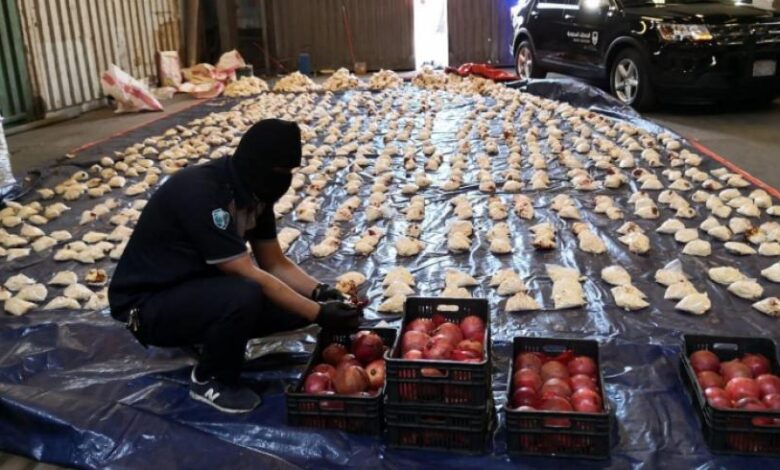A Saudi customs officer opens imported pomegranates hiding Captagon pills, Jeddah, Saudi Arabia (AP)
UPDATE, MAY 31:
The US has blacklisted two Damascus-based exchange firms, Al-Fadel Exchange and the Al-Adham Exchange Company, for helping the Assad regime “maintain access to the international financial system in violation of international sanctions”.
The Treasury said the firms arranged millions of dollars in transfers since 2021 to accounts in the US-designated Central Bank of Syria. Lebanon’s Hezbollah, an essential ally of the regime, also used the money service businesses to move money into Syria from other countries in the region.
Sanctioning the three brothers who own and operate Al-Fadel Exchange, the Treasury said it channeled payments from the regime to a Hezbollah financial official in return for shipments of Iranian oil.
UPDATE, MAY 9:
Jordanian warplanes struck a drugs factory and killed a smuggler in southern Syria on Monday, according to “local and intelligence sources”.
One strike hit the abandoned factory in the town of Kharab al-Shahem in Daraa Province. It was reportedly linked to the Lebanese organization Hezbollah, which has helped prop up the Assad regime since 2013.
Another strike on the village of Shaab in the neighboring province of Suweida killed prominent smuggler Marie al-Ramthan and his family in their home.
The strikes came a day after 13 of the Arab League’s 21 members agreed to readmit the Assad regime after more than 12 years.
One of the conditions was a program to curb the smuggling throughout the Middle East, which has been linked to senior regime figures including members of Bashar al-Assad’s family.
UPDATE, APR 25:
The European Union has sanctioned 25 individuals and eight entities in Syria over the Assad regime’s links to drug production and trafficking, particularly of the amphetamine Captagon.
Three cousins of Bashar al-Assad — Wasim Badi al-Assad, Samer Kamal al-Assad, and Mudar Rifaat al-Assad — are named. Lebanese nationals Nouh Zaitara and Hassan Dekko, known as “the king of Captagon”, are also cited.
The EU also sanctioned entities over regime oppression, including the al-Areen Foundation, directed by Asma al-Assad. Private security companies such as Al-Jabal Security and Protection, Castle for Security and Protection, and Aman for Protection and Security are also blacklisted as shell companies for pro-regime militias.
ORIGINAL ENTRY, MAR 29:
The US and UK have sanctioned Assad regime figures over their involvement in Syria’s illegal drug trade.
The Biden Administration blacklisted a series of individuals over the production and export of Captagon, an illegal amphetamine. Secretary of State Antony Blinken said the US will continue targeting drug traffickers and “those who provide support to the Syrian regime’s vicious war”.
About 80% of the world’s Captagon supply is produced in Syria. The UK government, announcing its own sanctions, says the drug is a “financial lifeline” of $57 billion for the Assad regime.
Among those designated by the US Treasury are Khalid Qaddour, a Syrian businessman who is a close associate of Bashar al-Assad’s brother Maher, the commander of the 4th Division of the regime’s Army. Qaddour is said to manage the 4th Division’s revenues from Captagon, according to the Americans.
Another designee is Samer Kamal al-Assad, a cousin of the Assads who allegedly oversees Captagon facilities in the regime-controlled port city of Latakia in western Syria. The US says he coordinates production and distribution with 4th Division and officials of the Lebanese group Hezbollah.
Another Assad cousin, Wassim Badi al-Assad, is accused of smuggling contraband, Captagon and other drugs throughout the region with the regime’s tacit support. Imad Abu Zureik, a militia leader linked to drug production and smuggling in southern Syria, is also designated.
Lebanese individuals are also named, including Hassan Muhammad Daqqou, a Lebanese-Syrian dual national arrested in 2021 on drug trafficking charges. The case arose from a shipment of Captagon intercepted in Malaysia on its way to Saudi Arabia.
The Treasury also blacklisted Lebanese arms dealer Noah Zaitar and two companies registered under Daqqou’s name in the Beka’a Valley in Lebanon.
The extent of the Captagon trade has been highlighted in the past three years by interceptions of large shipments. They include a shipment of 2.1 million Captagon pills with a value of $46 million, moving from Syria to Saudi Arabia via Romania in April 2020; 5.25 tons of Captagon seized in Greece in July 2019; 84 million Captagon pills confiscated in Salerno, Italy on July 1, 2020; 11 million pills in Egypt in November 2020; and Malaysia’s discovery of 94.8 million pills in March 2021.
However, the seizures have done little to check the movement of the drug throughout and beyond the region, beginning with its movement across the Syria-Jordan border.
Colonel Mustafa Hiari, the Jordanian Army’s spokesperson, summarized on State TV last year, “We are facing a war along the borders, a drugs war and led by organisations supported by foreign parties. These Iranian militias are the most dangerous because they target Jordan’s national security.”
See also Jordan: Assad Forces, Iran, and Hezbollah Responsible for Syria’s Illegal Drug Trade


Trackbacks/Pingbacks